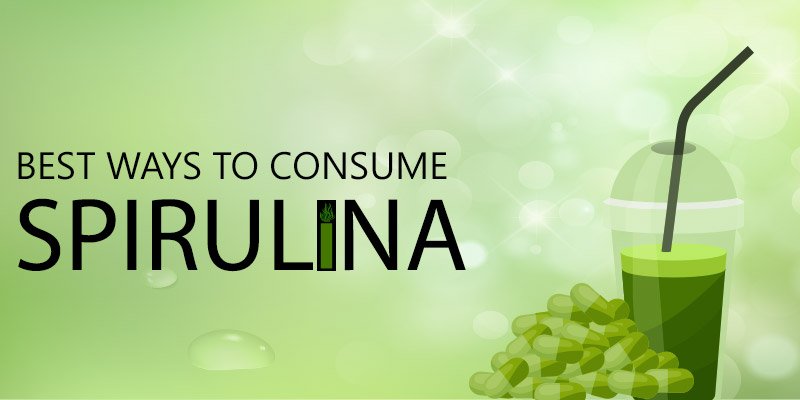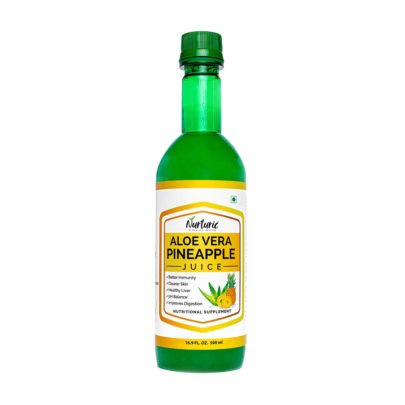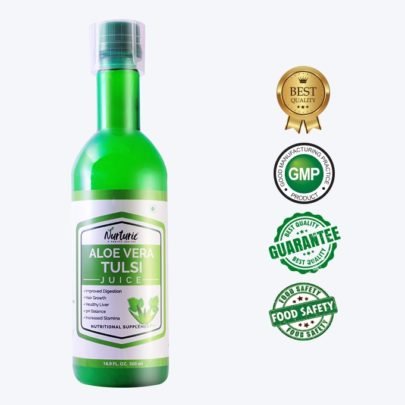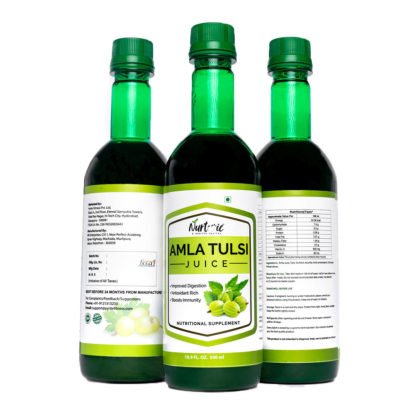- You have no items in your shopping cart
- Subtotal: ₹0.00
Adding an algae powder from tropical lakes in your smoothies is probably the last thing on your mind; but of late, spirulina, the miracle from the sea has become a popular addition in smoothies for many of the health focussed eaters. Even though spirulina is in the spotlight recently due to its nutritional value, bright green colour and plentiful health benefits, it was a superfood long before the 21st-century health enthusiasts started adding the blue-green powder into their smoothie glasses.
Spirulina is possibly the oldest form of life on earth, and Aztecs and native Africans have been consuming these edible algae since years. However, studies have shown that dried spirulina contains around 60 to 70% protein, and it is one of the few complete sources of plant-based protein. It means spirulina has all the essential amino acids that the body cannot produce. It is also a great source of Vitamin B12, A, E, and K and minerals such as calcium, iron, and magnesium.
What is Spirulina?
Spirulina indeed has a slew of health benefits, but what exactly is Spirulina? It is cyanobacteria or ‘blue-green algae’ that is safe for human consumption. Most often spirulina is consumed in powdered form, but you can have spirulina tablets as well. Spirulina grows in lakes, but it can also survive in weather conditions which are usually extreme for other organisms, and it is a non-toxic species of Arthrospira bacteria. Usually, spirulina is collected, freeze-dried and sold as a powder that can be added to food items or in smoothies. It is often used as a vegan source of protein.
Nutritional Value of Spirulina
Spirulina contains a variety of antioxidants, vitamins and minerals, all of which are integral for our well-being. One heaped tablespoon of spirulina or 7gms spirulina powder contains the following nutrients:
- 20 calories
- 4.02 gms protein
- 1.67 gms carbohydrates
- 0.54 gms fat
- 8 mg of calcium
- 2 mg of iron
- 14 mg of magnesium
- 8 mg of phosphorus
- 95 mg of potassium
- 73 mg of calcium
- 0.7 mg of Vitamin C
It also has around 60-65% protein content and contains essential compounds like thiamin, riboflavin, niacin, folate, and vitamins B-6, A, and K. Among the few active compounds in spirulina, the most important ingredient is the phycocyanobilin, it makes up around 1% of spirulina. This compound is like the bilirubin in the body, and it inhibits an enzyme compound, known as Nicotinamide Adenine Dinucleotide Phosphate (NADPH) oxidase. By inhibiting the NADPH oxidase, spirulina acts as an anti-oxidative and anti-inflammatory agent in the body.
Health Benefits of Spirulina
You already know that spirulina has joined the league of a superfood, now the question that comes up is how important it is. It is undoubtedly due to the multiple health benefits that spirulina has. Let us have a quick look at some of the most significant health benefits of this algae.

Aids in Weight Loss: It has been proved time and again that eating fewer calories is more effective than losing them for weight management. This is where spirulina has a pivotal role to play. It is a powerhouse of nutrients with lower calories. Therefore, even if you take a small quantity of the powder, you will get your daily requirements of nutrients without intaking many calories.
Improves Gut Health: Spirulina can aid in improving gut health. It is due to its structure wherein the cells do not have a tough fibrous structure, and hence digesting spirulina does not stress your small intestine. At the same time, spirulina does not contain much fibre, so you should have adequate amounts of fibre in your body.
Manages Diabetes: Multiple research papers show that the antioxidant property of spirulina may help in treating type 1 diabetes; however, more studies and proofs are required regarding this particular claim.
Lowers Cholesterol: If you start taking spirulina daily, you can expect a positive impact on the blood lipids and also it has been seen that spirulina can lower the LDL in the body while increasing the HDL or the good cholesterol in the body.
Reduces Blood Pressure: Since spirulina can lower cholesterols in the body, it is evident that it has a vital role to play on the blood pressure of the body. Regular consumption of spirulina will help you to control blood pressure levels in the body.
Boosts Metabolism: When you take spirulina, you can boost the metabolism of your body. A higher metabolism, on the other hand, makes a person feel energetic. Also, it increases the number of calories that they burn, the result is spirulina has an active role to play in the weight management of the body.
Reduces the symptoms of allergy: Usually, when a person suffers from allergies from dust, pollen or pets, the inside of the nose swells, and it is known as allergic rhinitis. Since spirulina has anti-inflammatory qualities, it can reduce the swellings inside the nose, thereby relieving people of their allergy symptoms.
Prevents the onset of chronic diseases: Spirulina is high with antioxidants, thus it can reduce the oxidative stress of the body, thereby decreasing the chances of inflammation in the body and the result is that the chances of chronic diseases become meagre.
Enhances performance during physical training: Many experts believe that spirulina has a positive impact even during the physical training sessions. Oxidative stress is a by-product of physical activities. Thus, intaking ample amounts of antioxidants can reduce the stress created during the exercises. The antioxidant of spirulina can reduce oxidative stress. At the same time, there are some studies which claim that spirulina improves strength and endurance, thereby enhancing exercise performance.
Treats mood disorders: A few studies state that spirulina might be able to treat mood disorders. The reason is spirulina is a great source of tryptophan, which is an amino acid and has a significant role to play in the serotonin production of the body, and serotonin is crucial for maintaining a happy mood amongst people.
Best Ways to Consume Spirulina
Learning about the slew of health benefits that spirulina has, you must be trying out ways to incorporate this alga in your diet. The good news is you can do it with ease. However, consuming spirulina directly is difficult due to its pungent taste. The best way to consume spirulina is in tablet form. Along with your daily supplements like Omega 3 or multivitamins, you can add the Spirulina tablet in your daily routine. As far as the dosage is concerned, you can consume anything between 1 – 8 gms daily to have a positive effect on your overall health.
At the same time, you can enjoy the goodness of spirulina in powdered form as well. The bright green coloured powder can be mixed with water and drunk, or else you could add the powder to smoothies, stocks or your soups. Another option is to have spirulina drops. Just like powder, the Spirulina drops can also be added to any food of your choice. Only a few drops and you can reap all its benefits. The only thing to consider while getting your Spirulina capsules, powder or drops is to get it from authentic manufacturers or retailers because if you get adulterated products, the entire purpose of having spirulina is defeated.
Side Effects of Spirulina
There is no denying the fact that spirulina nourishes the body with all the essential micronutrients, and the bright green coloured powder has proven positive impact on general well-being. Also, many with chronic problems like anaemia, hypertension, and diabetes use spirulina powder for considerable relief. But many users of spirulina have reported certain adverse effects from its usage as well. They have reported conditions like headaches, muscle pains, allergic reactions, excessive sweating and in some cases, insomnia as well.
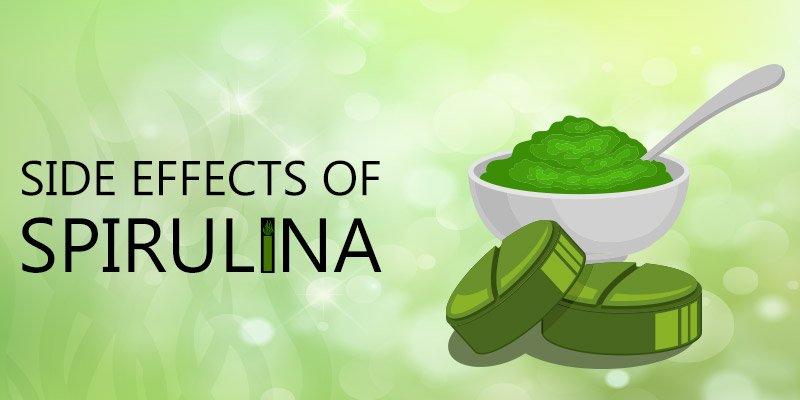
Therefore, in case you experience any of these symptoms, you should immediately stop consuming spirulina. At the same time, people who are allergic to seafood, seaweed or sea vegetables should undoubtedly stay away from spirulina.
Similarly, if you suffer from thyroid or have any kind of autoimmune disorder, gout problems or kidney stones or even if you are pregnant or are nursing, it is not a great idea to have spirulina. To be precise, if you plan to start with spirulina supplements, the best thing to do is to get in touch with your health care professional; he or she will tell you whether consuming spirulina is suitable for you or not.
Conclusion
The claim is that spirulina has a plethora of health benefits while some of it has already been proved, and there are some benefits which still need more authentication. However, unless you suffer from specific health conditions, you can start having spirulina as per the recommendations of your physician. But you shouldn’t forget that spirulina alone cannot take care of all the nutritional requirements of your body, you should incorporate a balanced diet, appropriate physical activities, and adequate rest for comprehensive well-being.




